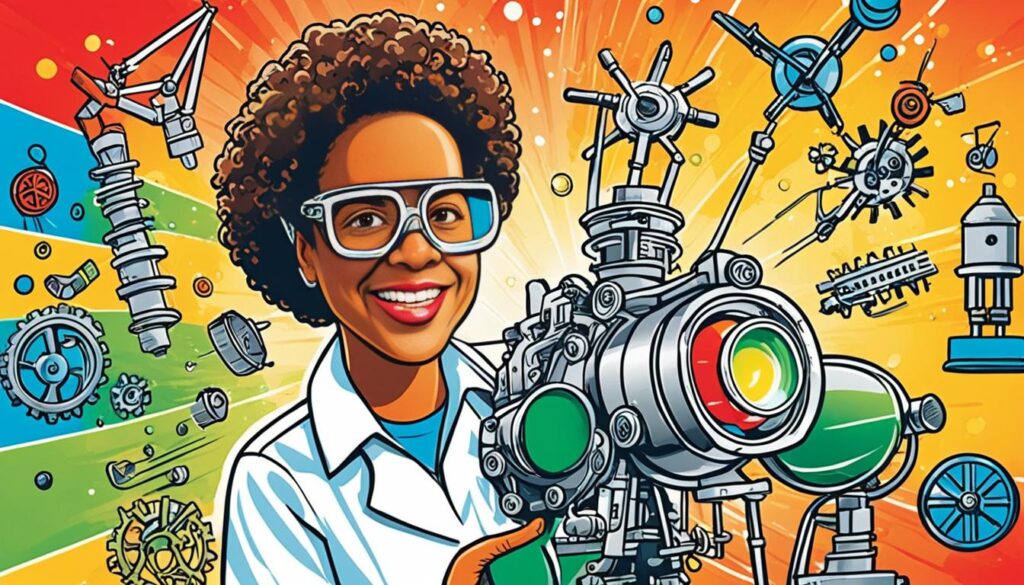Welcome to our latest article on legal case studies and litigation insights. In the ever-evolving field of law, it is crucial for legal professionals to stay informed about the latest developments and learn from real-life scenarios. By studying legal case studies, attorneys can gain valuable insights that can enhance their expertise and provide better representation to their clients.
In this article, we will delve into various aspects of legal case studies, starting with the inventorship of AI-assisted inventions. We will explore the guidance issued by the United States Patent and Trademark Office (USPTO) regarding the naming of AI systems as inventors on patents. Understanding the implications and potential disputes in this area can be crucial for attorneys handling patent cases involving AI.
Key Takeaways:
- The USPTO has provided guidance on the inventorship of AI-assisted inventions.
- AI systems cannot be named as inventors on patents under U.S. patent law.
- Inventions created with the assistance of AI can still be patentable.
- Human contribution to the conception of the invention is crucial.
- Attorneys need to gather evidence and understand the use of AI in order to handle these cases effectively.
Notable Inventors and Their Contributions
Throughout history, African American inventors have made significant contributions in various fields, revolutionizing industries and leaving a lasting impact on society. Their groundbreaking inventions have paved the way for progress and innovation. Let’s explore the remarkable achievements of some notable African American inventors:
Andrew Jackson Beard
- Improved double plow design
- Design for a rotary steam engine
- Pitch-adjustable double plow
Michael Croslin
- Medtek 410 – a revolutionary blood monitoring device
- Medtek 420 – a pulse monitoring device
Marian Croak
Renowned computer scientist who developed Voice Over Internet Protocol (VoIP) technology.
Terry Davis
First known African-American female denim manufacturer in the U.S., obtained design patents for her innovative jeans.
Shawn Springs
Founder of Windpact, a company focused on impact protection of the human brain. Obtained a patent for their Crash Cloud technology.
Dr. Patricia Bath
The first African American female doctor to receive a patent, invented a method for removing cataracts using laser technology.
Granville T. Woods
Also known as the “Black Edison,” developed important electrical inventions, including the railway telegraphy system.
Alice Parker
Designed a gas furnace that paved the way for modern heating systems.
Thomas Jennings
The first African American to receive a U.S. patent, invented an early method of dry cleaning.
Elijah J. McCoy
An African American inventor who obtained over 50 patents in his lifetime. His most notable invention was a lubricating mechanism for trains.
These inventors and their groundbreaking inventions have contributed immensely to their respective fields, inspiring future generations and shaping the world we live in today.

| Inventor | Notable Inventions |
|---|---|
| Andrew Jackson Beard | Improved double plow design, rotary steam engine, pitch-adjustable double plow |
| Michael Croslin | Medtek 410 (blood monitoring device), Medtek 420 (pulse monitoring device) |
| Marian Croak | Voice Over Internet Protocol (VoIP) technology |
| Terry Davis | Innovative jeans (design patents) |
| Shawn Springs | Crash Cloud technology (impact protection of the human brain) |
| Dr. Patricia Bath | Method for removing cataracts using laser technology |
| Granville T. Woods | Railway telegraphy system |
| Alice Parker | Gas furnace |
| Thomas Jennings | Early method of dry cleaning |
| Elijah J. McCoy | Lubricating mechanism for trains |
Epic Charter Schools Founders Agree to Preserve Bank Account Assets
The founders of Epic Charter Schools, Ben Harris and David Chaney, have agreed to preserve their bank account assets if they are convicted in the massive racketeering and embezzlement case against them. The Oklahoma Attorney General’s Office had sought to freeze the bank account, which is believed to contain approximately $5.5 million. Harris and Chaney objected initially but later reached an agreement with prosecutors.
As part of the agreement, they will waive privacy to the bank account and provide monthly reports to prove asset preservation. This case has been labeled as the largest abuse of taxpayer funds in the history of the state by the State Auditor and Inspector. The criminal charges include embezzlement, money laundering, computer crimes, and conspiracy to defraud the state.

Conclusion
Legal professionals can greatly benefit from studying legal case studies. By diving into these real-life scenarios, we gain valuable insights that can shape our approach to handling similar situations. For instance, understanding the complexities surrounding the inventorship of AI-assisted inventions can equip attorneys to navigate patent cases in this rapidly evolving field. By staying informed about the guidelines set by the United States Patent and Trademark Office, legal professionals can ensure they have the necessary knowledge to address disputes and provide effective representation to their clients.
Furthermore, learning about the contributions of notable inventors, especially those from underrepresented communities, can inspire and inform our own work. These groundbreaking inventors have not only left a lasting impact on society but have also paved the way for future generations. Their stories remind us of the importance of diversity and inclusion within the legal profession and inspire us to advocate for justice and equal opportunities.
Lastly, high-profile cases like the Epic Charter Schools embezzlement case serve as valuable learning opportunities. By analyzing these complex and widely publicized cases, legal professionals can gain practical knowledge and insights that can be applied to their own practice. By identifying the challenges faced by others and the strategies employed to overcome them, we can enhance our expertise and provide better representation to our clients.
So, whether it’s delving into the intricacies of AI-assisted inventions or drawing inspiration from the accomplishments of notable inventors, legal professionals should embrace the power of case studies. By learning from litigation, we sharpen our skills, expand our knowledge, and ultimately become more effective in serving our clients and upholding justice.
FAQ
Can AI systems be named as inventors on patents?
No, according to the United States Patent and Trademark Office (USPTO) guidance, only human beings qualify as inventors under U.S. patent law.
Can inventions created with the assistance of AI still be patentable?
Yes, inventions created with AI assistance can still be patentable if at least one human being made a significant contribution to the conception of the claimed invention.
What challenges may arise in determining the contribution of the human being versus the AI system?
Determining the contribution of the human being versus the AI system may lead to disputes and litigation. Attorneys will need to gather evidence and understand how AI was used in order to properly handle these cases.
Who are some notable inventors and what are their contributions?
Some notable inventors include Andrew Jackson Beard, Michael Croslin, Marian Croak, Terry Davis, Shawn Springs, Dr. Patricia Bath, Granville T. Woods, Alice Parker, Thomas Jennings, and Elijah J. McCoy. Their inventions range from improved plow designs to innovative medical devices and advancements in technology.
What did the founders of Epic Charter Schools agree to in the embezzlement case?
Ben Harris and David Chaney, founders of Epic Charter Schools, agreed to preserve their bank account assets if they are convicted in the racketeering and embezzlement case. They will waive privacy to the bank account and provide monthly reports to prove asset preservation.
What are the criminal charges against the founders of Epic Charter Schools?
The criminal charges include embezzlement, money laundering, computer crimes, and conspiracy to defraud the state.
How can legal professionals benefit from studying legal case studies?
Legal professionals can gain valuable insights from studying legal case studies, including understanding inventorship in AI-assisted inventions, learning from the contributions of notable inventors, and applying lessons from high-profile cases like the Epic Charter Schools embezzlement case to enhance their expertise and provide better representation to their clients.
Source Links
- https://www.jdsupra.com/legalnews/celebrate-diversity-in-intellectual-1371168/
- https://www.fredlaw.com/alert-u-s-patent-and-trademark-office-issues-guidance-on-inventorship-for-ai-assisted-inventions
- https://tulsaworld.com/news/local/education/epic-co-founders-agree-to-preserve-bank-account-assets-prosecutors-want-forfeited/article_04ef2184-cc22-11ee-907f-13385cc265bb.html